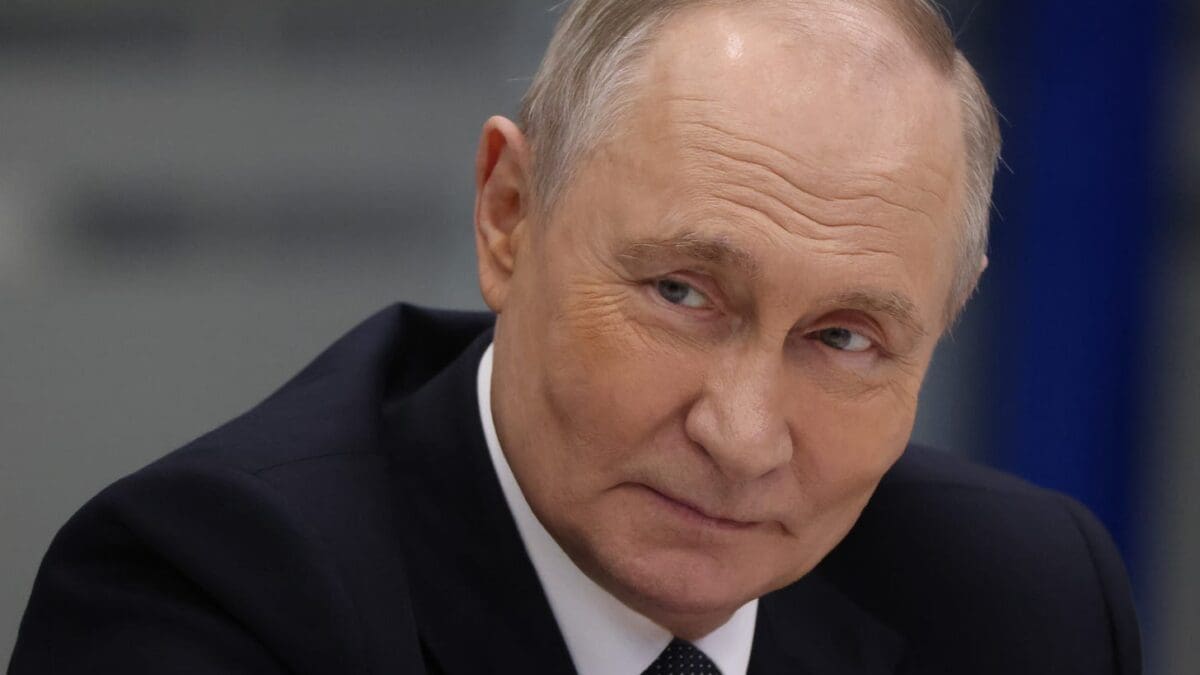
Judge finds Newsmax aired false and defamatory claims about voting-tech company
April 9, 2025
Jury awards $1.68 billion to women who accused director Toback of sexual abuse
April 10, 2025WHILE DONALD TRUMP IS WAGING A TRADE WAR on penguins and American pocketbooks, his Ukrainian peace-deal effort seems all but dead and forgotten. Or, in the blunt words of Russian expatriate lawyer and political activist Mark Feygin: “Trump’s peace plan has gone down the drain.”
Late last month, Trump was touting an apparent success in his peacemaking quest: A Russian/Ukrainian agreement on a partial ceasefire, achieved after the Kremlin rejected a thirty-day full ceasefire proposed by the United States and accepted by Ukraine. Even the limited ceasefire was narrower than the Ukrainians had expected: Their initial statement referred to pausing attacks on “energy and infrastructure,” while Russia spoke only of “energy infrastructure.” Such an agreement, even aside from predictable Russian violations, benefits the Kremlin by protecting Russian oil depots and processing facilities which literally fuel Russia’s war effort, and which had become sitting ducks for Ukrainian drones. Russian strikes on the Ukrainian energy grid, on the other hand, are not quite as devastating now that winter is over. Other kinds of “infrastructure”—non-“energy infrastructure”—are of greater concern, especially hospitals.
On March 25, the White House announced that it had also brokered an agreement with Russia and Ukraine to “eliminate the use of force” in the Black Sea. Once again, this deal was likely to benefit Moscow more than Kyiv. Ukraine had already managed to secure the passage of its grain-exporting ships in the Black Sea. It had also effectively neutralized Russia’s fabled Black Sea Fleet by destroying or damaging about a third of its 74 warships and forcing the rest to retreat to safe Russian waters, a victory the maritime ceasefire could reverse. Even so, Ukraine agreed—while Russia demanded extra concessions, namely exemptions from U.S. and European sanctions to allow some Russian banks to rejoin the SWIFT global banking-payment system. It’s unclear whether or when the ceasefire will formally take effect, but in the meantime, Russia’s Black Sea fleet is murdering Ukrainian children.
In the midst of all this supposed peacemaking, Vladimir Putin gave no indications that he wants anything but more war. On March 27, he made a televised visit to the nuclear-powered submarine Arkhangelsk, during which he not only reiterated his claims about Volodymyr Zelensky being an “illegitimate” president because of the canceled elections in Ukraine (as constitutionally mandated in wartime) but also asserted that all of the Ukrainian government lacks legitimacy and that the real power in Ukraine is now in the hands of armed neo-Nazi groups. The solution, he said, was to place Ukraine under the “temporary administration” of the United Nations and the United States (and maybe even the Europeans), hold “democratic elections,” and establish “a competent government that enjoys public trust” and can be a legitimate negotiating partner.
Leave aside the stunning cynicism of such attacks on Zelensky’s legitimacy from the man who repeatedly vandalized the Russian constitution to make himself president for life. What’s abundantly clear is that Putin is not willing to negotiate or make agreements until he’s stripped Ukraine of its sovereignty and installed a satisfactory puppet regime.
For good measure, Putin also saber-rattled about the Russian navy’s nuclear prowess and insisted that Russia was clearly winning in Ukraine: “Our troops have the strategic initiative along the entire contact line. I just recently said, ‘We’ll grind them down’; there are reasons to believe we’ll finish them off.”
Do these sound like the words of a man who, as Trump has repeatedly told us, “wants peace”?
PUTIN’S COMMENTS ON THE SUBMARINE seem to have finally annoyed Trump. On March 30, he called NBC News’s Kristen Welker to say that he was “very angry” and even “pissed off”; for once, he actually threatened to punish Russia, albeit hedging his words with mealy-mouthed “ifs”:
If Russia and I are unable to make a deal on stopping the bloodshed in Ukraine, and if I think it was Russia’s fault—which it might not be—but if I think it was Russia’s fault, I am going to put secondary tariffs on oil, on all oil coming out of Russia. . . . That would be that if you buy oil from Russia, you can’t do business in the United States. There will be . . . a 25- to 50-point tariff on all oil.
Some Ukrainian Trump-watchers took the president’s apparent frustration as a hopeful sign. Some also saw a cause for optimism in the fact that shortly before this statement, Trump had been playing golf at Mar-a-Lago with Finnish President Alexander Stubb, a Russia hawk who has confirmed that he and Trump discussed Russia’s vexing habit of trying to throw in bonuses for itself when an agreement is already finalized. Ukrainian journalist Vitaly Portnikov speculated in a YouTube interview that Stubb may have convinced Trump that Putin was jerking him around and making him look like a “weakling,” triggering an “emotional reaction” from the thin-skinned Trump.
But just a few hours after venting to Welker, Trump struck a more conciliatory note: Yes, he was “disappointed in a certain way” because of Putin’s comments about Zelensky (“He’s supposed to be making a deal with him, whether you like him or you don’t like him”), but he still didn’t think Putin was going to “go back on his word.” He also reverted to sniping at Zelensky, this time for wanting to “back out of” or “renegotiate” the rare earths deal.
Meanwhile, Russia got another break: The Trump administration temporarily lifted sanctions on high-level Putin adviser Kirill Dmitriev so that he could come to Washington for talks last week. The talks, however, reportedly focused primarily on avenues of Russian-American cooperation while leaving Ukraine on the back burner. And right after Dmitriev’s visit, Russia escalated its attacks on Ukrainian residential neighborhoods. In Kryvyi Rih, a missile supposedly targeting military personnel hit a playground, killing nine children and eleven adults. According to Ukrainian journalist Ihor Yakovenko, Russian strikes on Ukrainian cities are up 52 percent since the start of the negotiations.
Trump’s reaction to the latest attacks? “We’re talking to Russia. We’d like them to stop. I don’t like the bombing.” And: “I’m not happy about what’s going on with the bombing because they’re bombing like crazy right now. . . . I don’t know what’s happening there.” In a scathing commentary, Russian-Ukrainian radio host and YouTuber Matvey Ganapolsky dismissed these words as “pathetic babbling” after all the threats of “scary sanctions” if Russia undermined the peace talks. He also flatly concluded, “There will be no peace.”
The White House still claims that the peace negotiations are happening. Trump makes obligatory noises about the need to stop the killing. National Economic Council Director Kevin Hassett even told ABC that the reason Russia was one of the very few countries spared in Trump’s tariff barrage was that slapping it with tariffs could disrupt peace talks—a reasoning that apparently didn’t apply to Ukraine, which did get tariffed (and which, unlike Russia, actually imports from the United States more than it exports). And yet the latest round of U.S.-Russia talks, which opens in Istanbul today, will be entirely Ukraine-free: State Department spokeswoman Tammy Bruce has stressed that “Ukraine is not, absolutely not, on the agenda,”
The bottom line is that, as Zelensky has repeatedly charged, Putin has no interest in ending the war. If anything, he seems to be escalating it, perhaps emboldened by a more friendly White House. Russia has just announced its biggest spring draft since 2011, with plans to call up 160,000 men—up from around 135,000 in 2019–22 and about 150,000 in 2023–24. (While the Kremlin’s stated policy is that these recruits cannot be used to fight in the “special military operation” in Ukraine, the young men are frequently pressured or even tricked into signing military contracts that allow them to be sent to the frontlines. Or they’re just sent there anyway, rules or no rules.) The Ukrainian government has also been warning about apparent Russian preparations for a spring offensive—which may already be here: On Wednesday, the Ukrainian military’s top commander, Oleksandr Syrskyi, said that Russia had increased its attacks in the Kharkiv region and in the border region of Sumy at a rate that amounted to a new offensive.
Yuri Fedorov, a prominent Russian military expert now teaching in Prague who has also talked about signs of an imminent spring offensive by Russian forces, does not believe such an offensive has much chance of succeeding. Things are not going nearly as well for Russia as Putin claims: While Russian forces are still making some gains, British intelligence reports that the tempo of their advance has been declining since last November and has now slowed down to a crawl, with Ukrainian troops successfully counterattacking in many areas and retaking some lost positions. While Ukrainian forces have been mostly dislodged from Russia’s Kursk region, they maintain enough of a foothold to tie down a large Russian contingent—and have opened a second front on Russian territory in the Belgorod region. And even though Ukraine has apparently refrained from targeting Russian oil facilities under the “energy ceasefire,” its drones are still striking and disabling important Russian military factories, including producers of explosives and of optic fiber used in drones.
Ukraine’s fight against Russian aggression will almost certainly continue into 2026. The future of America’s role as an ally in that fight, which continues to be crucial despite increased European support, is very much up in the air. It depends, among other things, on whether pro-Ukraine Republicans in Congress can find their spines and join the Democrats in pushing for more sanctions against Russia and for continued aid to Ukraine. Trump may quietly drop his faux peace effort once its futility becomes undeniable. If not, maybe someone should get Alexander Stubb back to Mar-a-Lago for another round of golf.
Great Job Cathy Young & the Team @ The Bulwark Source link for sharing this story.





